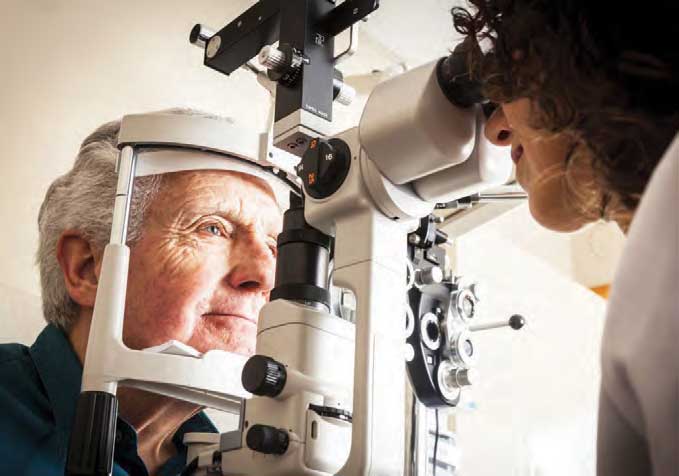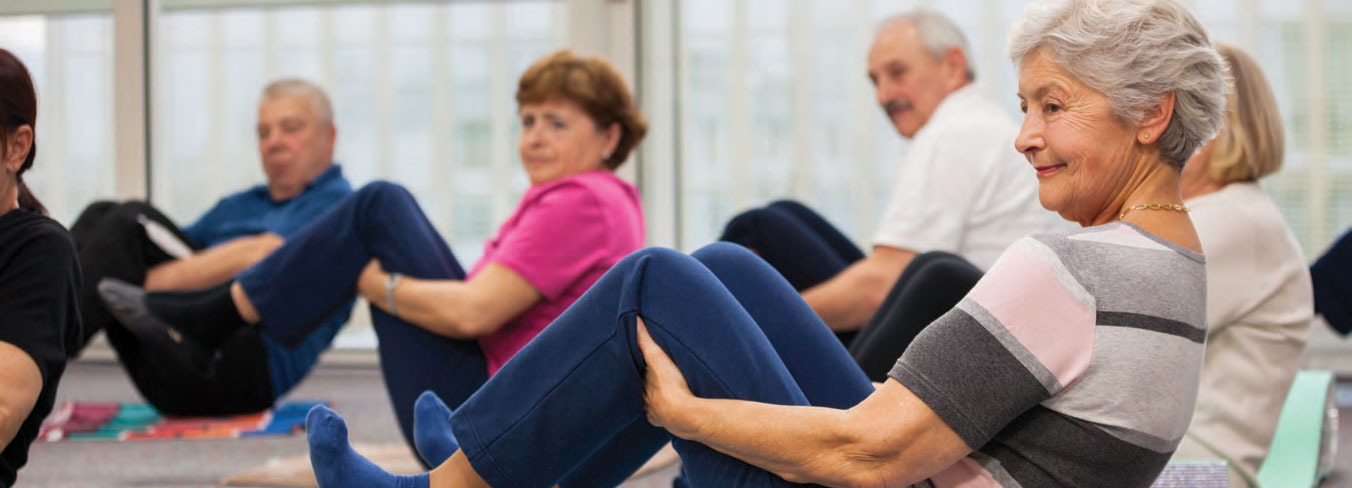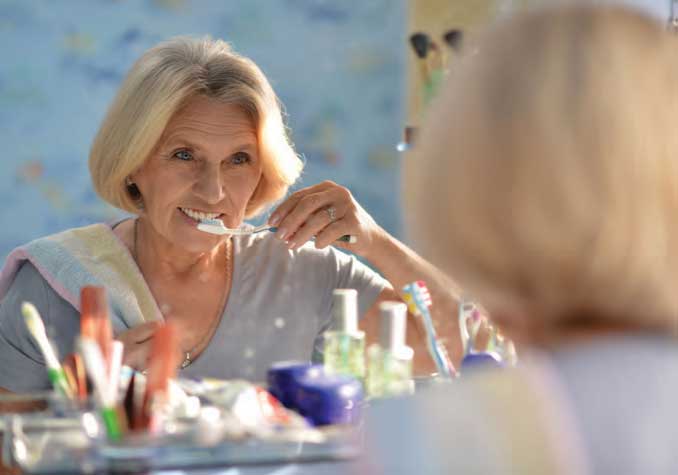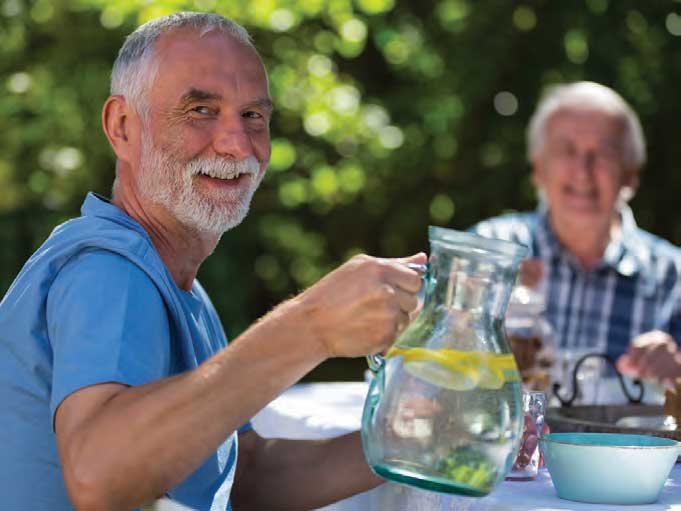
What usually happens in the winter? We have shorter days with less sunshine, cooler temperatures, more germs spreading, slicker surfaces and more holidays with food. All of these side effects of winter can affect our health. So how can we stay healthy during the winter season?
According to Centers for Disease Control and Prevention, older individuals live more independently, have fewer health costs, and remain healthy if they engage in preventative services and practice healthy behaviors. Five preventative services and/or healthy behaviors include:
1. Soak Up The Sunshine
To help avoid the winter blues, soak up 10-15 minutes of sunshine a day. Winter has limited daylight, so try to sit next to a window to get sunlight when it is available. Though it might be too cold to go outside, it is still important to get some sunshine. The sun is a great source of vitamin D which helps decrease inflammation, depression, and illness while promoting bone growth. The sun also helps to enhance your mood by increasing your serotonin levels. Serotonin is
known to positively affect your mood and behavior.
2. Get Your Flu Shot
The winter time brings dryer air and colder temperatures, thus creating an environment for germs to live longer. To prevent disease, get vaccinated. As we age, our immune systems become weaker and therefore we become more susceptible to become ill. People 65 and older are 90 percent of flu-related deaths and 60 percent of flu-related hospitalizations. Once vaccinated, it takes two weeks for our body to develop an immune response which means, ideally, we should get vaccinated in mid-October.
3. Healthy Eating Habits
What comes with the winter season? Many holidays with great food! While we eat, we should be mindful of the amount and types of food we are putting into our bodies. Remember these simple phrases:
“Out of sight, out of mind”
This philosophy teaches you to place your food on your plate and then walk away from the food. Many times individuals consume food just because it is right in front of them. However, if we adopt the “out of sight, out of mind” philosophy, we will remove ourselves from having easy access to food.
“Smaller plate, smaller portion”
Where you taught to clean your plate? Sometimes this can cause us to overeat even when our body tells us to stop. To help avoid overeating, use a smaller plate. The smaller the plate, the less food we will eat and if we have the “out of sight, out of mind” philosophy, we will not go back for several servings.
“Colorful plate, healthy weight”
What are the most colorful foods? Fruits and vegetables. According to the World Health Organization, insufficient consumption of fruit and vegetables have caused 1.7 million deaths worldwide. Eating colorful foods can prevent obesity as well as heart disease, diabetes, and cancer. Fruits and vegetables contain adequate amounts of vitamins and fiber.
4. Safety
What else can occur in the winter season? Slippery walking surfaces and occasional outings. Walking outdoors can be more difficult than walking inside our homes. There are sidewalk cracks, curbs, and changes in walking surfaces. Now place some wintery mix on those sidewalks and it can create even more safety hazards. To prevent slipping, always ensure you have someone with you and try walking flat-footed. We also have to be mindful of safety in our family and
friends homes during the holiday season.
Items to consider in homes other than your own:
- Are there throw rugs?
- Are there steps?
- Is there room to navigate with my walker, wheelchair, or cane?
- Do their chairs have arms to aid with standing?
- Is their toilet raised or have grab bars to aid with standing?
5. Physical Activity
Cooler temperatures are brought on by high air pressure which increases our blood pressure and can trigger thickness in the fluid around our joints causing joint pain. Cold weather also thickens our blood which can cause more heart complications. For this reason, it is important to stay active all year around. Exercise can help reduce blood pressure, arthritis pain, and heart disease.
 If you feel ill and weak this winter season, therapy can help. Therapy can assist in developing a wellness plan that will help prevent loss of strength, range of motion, and falls so you can continue living an independent and active lifestyle. Let’s be preventative this winter season and not wait until something happens for us to take action.
If you feel ill and weak this winter season, therapy can help. Therapy can assist in developing a wellness plan that will help prevent loss of strength, range of motion, and falls so you can continue living an independent and active lifestyle. Let’s be preventative this winter season and not wait until something happens for us to take action.
Please join us December 19th at 1:30 pm in the PAC for our Smart Moves presentation on this topic.

 Some common reasons that cause sleep problems with age include poor sleep habits. When one does not keep a schedule for going to bed and waking up, it can affect your body’s internal clock and make it even harder to get good sleep. At any age, drinking alcohol before bedtime, napping too much, or staying in bed when you are not sleeping can make it difficult to get good sleep. Worry, stress, or grief, which all comes with aging and its life changes, can all alter your sleep patterns. Sleep disorders can be a reason for one’s sleeping problems. Insomnia and disrupted sleep in elderly people are a common side effect caused by many chronic medical conditions such as arthritis, congestive heart failure, and depression. Respiratory disorders, such as sleep apnea, which cause multiple arousals during the night, also become more common as people age. Unfortunately, sleep problems in older adults often go undiagnosed and untreated simply because many people believe sleep problems are a normal part of aging or that nothing can be done to help them sleep better. Thankfully, treating any underlying medical disorders can dramatically improve sleep.
Some common reasons that cause sleep problems with age include poor sleep habits. When one does not keep a schedule for going to bed and waking up, it can affect your body’s internal clock and make it even harder to get good sleep. At any age, drinking alcohol before bedtime, napping too much, or staying in bed when you are not sleeping can make it difficult to get good sleep. Worry, stress, or grief, which all comes with aging and its life changes, can all alter your sleep patterns. Sleep disorders can be a reason for one’s sleeping problems. Insomnia and disrupted sleep in elderly people are a common side effect caused by many chronic medical conditions such as arthritis, congestive heart failure, and depression. Respiratory disorders, such as sleep apnea, which cause multiple arousals during the night, also become more common as people age. Unfortunately, sleep problems in older adults often go undiagnosed and untreated simply because many people believe sleep problems are a normal part of aging or that nothing can be done to help them sleep better. Thankfully, treating any underlying medical disorders can dramatically improve sleep.
 Do you often feel like you are tired or just don’t have the energy to do something you would like to? You are not alone. Many people report experiencing this issue, especially as they age, or with changes in the weather. The good news is, there are some things that can be done to increase your energy levels.
Do you often feel like you are tired or just don’t have the energy to do something you would like to? You are not alone. Many people report experiencing this issue, especially as they age, or with changes in the weather. The good news is, there are some things that can be done to increase your energy levels. If you feel your lack of energy is causing you to be unbalanced or if you feel it prevents you from doing your daily tasks safely, therapy is another great option for you. Therapists can help you work toward more normal levels of energy while making sure you are safe and progressing toward your goals.
If you feel your lack of energy is causing you to be unbalanced or if you feel it prevents you from doing your daily tasks safely, therapy is another great option for you. Therapists can help you work toward more normal levels of energy while making sure you are safe and progressing toward your goals.
 Hypertension, or high blood pressure, is the single most significant risk factor for heart disease. It’s sometimes called “the silent killer” because it has no symptoms. One in three American adults has high blood pressure, yet about 21% don’t even know they have it. Of those with high blood pressure, 69% are receiving treatment, but only 45% have their blood pressure controlled.
Hypertension, or high blood pressure, is the single most significant risk factor for heart disease. It’s sometimes called “the silent killer” because it has no symptoms. One in three American adults has high blood pressure, yet about 21% don’t even know they have it. Of those with high blood pressure, 69% are receiving treatment, but only 45% have their blood pressure controlled. The evidence is clear: people who exercise have better health than those who do not. A recent American Heart Association survey shows that fewer than two out of every ten Americans get the recommended 150 minutes or more of moderate physical activity each week.
The evidence is clear: people who exercise have better health than those who do not. A recent American Heart Association survey shows that fewer than two out of every ten Americans get the recommended 150 minutes or more of moderate physical activity each week. Eating for good health means choosing lots of fruits and vegetables, whole-grain carbohydrates, and fat-free or low-fat dairy products. You might have to train yourself to avoid foods and drinks with high sodium or added sugar. Another perhaps surprising part of healthy eating is to regularly include fish rich in Omega-3’s. It’s great for your heart and your brain.
Eating for good health means choosing lots of fruits and vegetables, whole-grain carbohydrates, and fat-free or low-fat dairy products. You might have to train yourself to avoid foods and drinks with high sodium or added sugar. Another perhaps surprising part of healthy eating is to regularly include fish rich in Omega-3’s. It’s great for your heart and your brain. Everyone has cholesterol. It’s the waxy substance in your bloodstream and cells. Some cholesterol is important for good health, but too much cholesterol in your blood puts you at major risk for heart disease and stroke. When too much LDL (or bad) cholesterol circulates in the blood, it can slowly build up inside the walls of your arteries that feed your heart and brain. Cholesterol particles combine with other substances in your blood to form plaque. This can narrow the arteries and make them less flexible, putting you at major risk for heart disease and stroke.
Everyone has cholesterol. It’s the waxy substance in your bloodstream and cells. Some cholesterol is important for good health, but too much cholesterol in your blood puts you at major risk for heart disease and stroke. When too much LDL (or bad) cholesterol circulates in the blood, it can slowly build up inside the walls of your arteries that feed your heart and brain. Cholesterol particles combine with other substances in your blood to form plaque. This can narrow the arteries and make them less flexible, putting you at major risk for heart disease and stroke.
 Your digestion turns all carbohydrates into sugar or glucose which is then carried throughout your bloodstream to give you energy. Complex carbohydrates like whole-wheat breads and grains, and fruits and vegetables take longer to digest, helping to keep your energy supply steady. But simple sugars, like sweets, donuts, and white bread are very quickly converted into glucose, which can cause your body to call for extra surges of a hormone, insulin, to help regulate the energy supply. If your blood sugar is high, as often happens when you maintain a diet with too many simple carbohydrates, there will be a growth of plaque in your arteries. Diabetes is treatable but very dangerous and can often lead to heart disease and stroke. Even if you don’t have diabetes, you need to know your blood sugar level. Be sure to get a blood sugar level test after fasting at least every three years, because controlling glucose is an important part of stopping heart disease before it starts.
Your digestion turns all carbohydrates into sugar or glucose which is then carried throughout your bloodstream to give you energy. Complex carbohydrates like whole-wheat breads and grains, and fruits and vegetables take longer to digest, helping to keep your energy supply steady. But simple sugars, like sweets, donuts, and white bread are very quickly converted into glucose, which can cause your body to call for extra surges of a hormone, insulin, to help regulate the energy supply. If your blood sugar is high, as often happens when you maintain a diet with too many simple carbohydrates, there will be a growth of plaque in your arteries. Diabetes is treatable but very dangerous and can often lead to heart disease and stroke. Even if you don’t have diabetes, you need to know your blood sugar level. Be sure to get a blood sugar level test after fasting at least every three years, because controlling glucose is an important part of stopping heart disease before it starts. Even if you’ve smoked for years, your body can start the repair process as soon as you stop. If you’re ready to start your plan for smoke-free health, it’s a good idea to talk with your healthcare provider. Medication can be helpful for some people during the kick-the-habit phase and research shows combining medical and behavioral therapies can increase success rates.
Even if you’ve smoked for years, your body can start the repair process as soon as you stop. If you’re ready to start your plan for smoke-free health, it’s a good idea to talk with your healthcare provider. Medication can be helpful for some people during the kick-the-habit phase and research shows combining medical and behavioral therapies can increase success rates.
 Serious eye conditions that are seen with aging are glaucoma, macular degeneration, and diabetic retinopathy. Glaucoma refers to diseases that cause optic nerve damage, some of which are related to an increase in intraocular pressure, which cause progressive vision loss. Symptoms are very few until diminished vision is noticed. Conventional treatments can be pretty drastic but research is showing that vigorous exercise may reduce the intraocular pressure associated with glaucoma. Macular degeneration is the leading cause of blindness among Americans over the age of 65. Dry macular degeneration causes gradual central vision loss and results from aging and thinning of tissues in the macula or deposit of pigment. Wet macular degeneration arises from the body’s attempt to make up for lack of nutrients by building extra blood vessels beneath the retina, but the new blood vessels leak fluid which causes permanent damage to the retinal cells. Studies are showing that AMD is a nutritional and lifestyle responsive eye disease. Diabetic retinopathy is vision-threatening damage to the retina caused by diabetes. Blindness is largely preventable if the patient and doctor work together for proper use of medications, blood sugar testing, and proper diet and lifestyle.
Serious eye conditions that are seen with aging are glaucoma, macular degeneration, and diabetic retinopathy. Glaucoma refers to diseases that cause optic nerve damage, some of which are related to an increase in intraocular pressure, which cause progressive vision loss. Symptoms are very few until diminished vision is noticed. Conventional treatments can be pretty drastic but research is showing that vigorous exercise may reduce the intraocular pressure associated with glaucoma. Macular degeneration is the leading cause of blindness among Americans over the age of 65. Dry macular degeneration causes gradual central vision loss and results from aging and thinning of tissues in the macula or deposit of pigment. Wet macular degeneration arises from the body’s attempt to make up for lack of nutrients by building extra blood vessels beneath the retina, but the new blood vessels leak fluid which causes permanent damage to the retinal cells. Studies are showing that AMD is a nutritional and lifestyle responsive eye disease. Diabetic retinopathy is vision-threatening damage to the retina caused by diabetes. Blindness is largely preventable if the patient and doctor work together for proper use of medications, blood sugar testing, and proper diet and lifestyle.
 If you feel ill and weak this winter season, therapy can help. Therapy can assist in developing a wellness plan that will help prevent loss of strength, range of motion, and falls so you can continue living an independent and active lifestyle. Let’s be preventative this winter season and not wait until something happens for us to take action.
If you feel ill and weak this winter season, therapy can help. Therapy can assist in developing a wellness plan that will help prevent loss of strength, range of motion, and falls so you can continue living an independent and active lifestyle. Let’s be preventative this winter season and not wait until something happens for us to take action.


 Here are a couple ways to keep your mind and body active.
Here are a couple ways to keep your mind and body active.  Eat well
Eat well Keep learning
Keep learning As we age there are some things that we tend to let fall by the wayside. Dental health seems to be one of the personal hygiene steps that can be forgotten. Since dental health is connected to whole-body health, it’s important to keep oral health a priority. Senior dental problems can be common and since oral health directly impacts the health of the rest of the body, these issues need to be taken seriously. Taking care of elderly teeth and gums is just as important as digestive or heart health.
As we age there are some things that we tend to let fall by the wayside. Dental health seems to be one of the personal hygiene steps that can be forgotten. Since dental health is connected to whole-body health, it’s important to keep oral health a priority. Senior dental problems can be common and since oral health directly impacts the health of the rest of the body, these issues need to be taken seriously. Taking care of elderly teeth and gums is just as important as digestive or heart health. Some reasons why senior dental health is so important are that research has shown a connection between gum disease and heart disease. Maintaining good oral hygiene is a powerful weapon against heart attacks, strokes, and other heart disease conditions. Poor oral health has been linked to pneumonia in older adults. By breathing in bacterial droplets from the mouth to the lungs, seniors are more susceptible to the condition. Good oral hygiene is a good way to combat these bacteria. Gum disease is caused by plaque and food left in our teeth, in addition to the use of tobacco products, unhealthy diets, poor fitting bridges and dentures, and diseases like anemia, cancer, and diabetes. Gum disease can instigate tooth loss and can be very serious for overall health as it has been linked to many problems in the body.
Some reasons why senior dental health is so important are that research has shown a connection between gum disease and heart disease. Maintaining good oral hygiene is a powerful weapon against heart attacks, strokes, and other heart disease conditions. Poor oral health has been linked to pneumonia in older adults. By breathing in bacterial droplets from the mouth to the lungs, seniors are more susceptible to the condition. Good oral hygiene is a good way to combat these bacteria. Gum disease is caused by plaque and food left in our teeth, in addition to the use of tobacco products, unhealthy diets, poor fitting bridges and dentures, and diseases like anemia, cancer, and diabetes. Gum disease can instigate tooth loss and can be very serious for overall health as it has been linked to many problems in the body.


 © 2025 Kirby Pines LifeCare Community. All Rights Reserved |
© 2025 Kirby Pines LifeCare Community. All Rights Reserved | 